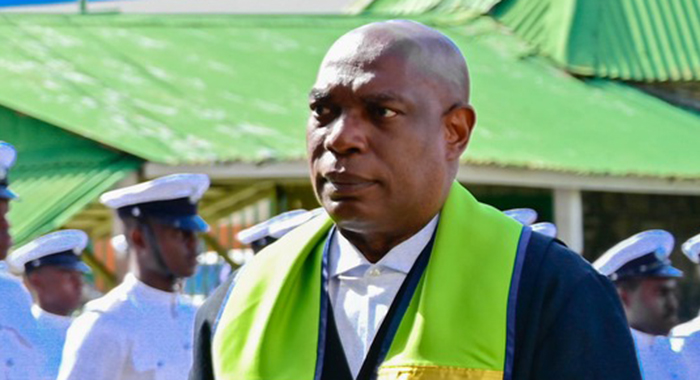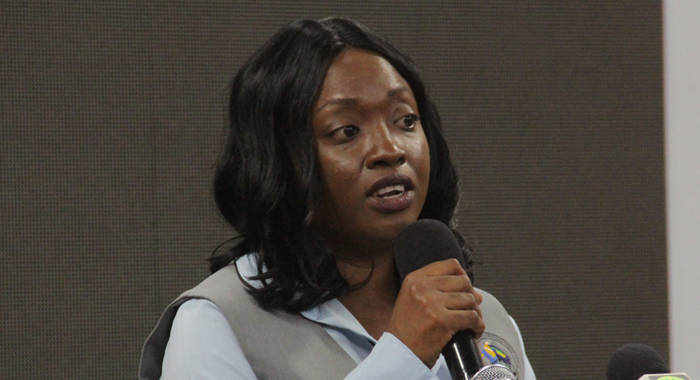St. Vincent and the Grenadines continues to be without the services of a psychiatrist even as the nation’s chief prosecutor says more victims of crime are also displaying psychological disorders.
The years-long absence of a psychiatrist in the country came into sharp focus again on Thursday at the closing of the session of the High Court ahead of the Christmas holidays.
“I continue, as the head of chambers, to struggle with how to deal with defendants who have psychiatric problems,” Director of Public Prosecution (DPP) Sejilla McDowall told the special sitting.
She said that on the other hand, there are witnesses, more so than defendants, who are presenting with psychological disorders as a result of the impact of crime.
“Those are the numbers that are not presented here. What is the real impact of crime?” she said.
Earlier in the sitting, acting Superintendent of Prisons Dwayne Bailey told the court that there were 40 mentally ill people in the prison system, 24 of whom were there for murder or manslaughter.
Seven of them were awaiting trial.
Responding to a question from defence counsel Mikhail Charles, about whether there are personalised care plans or mentally ill inmates, Bailey said that the staff nurse and nursing assistant who joined his staff this year care for dispensing medication to the prisoners.
“That mental health issue is something that I have sought to address,” Bailey said, addressing an issue he was flagging with the court for the second time this year.
“It is a worrying concern. They are mixed in with the general population, they have access to contraband, drugs, sharp implements, to cell phones and given the conditions at the prisons, there is not much I can do in relation to how they are housed,” the prison chief said.
“The state itself has issues with addressing mental health. It is no different in the prisons,” he said.
Some members of the jury laughed at the comment.

‘a real problem; … an urgent problem’ — judge
Speaking after Bailey and before Mc Dowall, Justice Brian Cottle noted the number of mentally ill people who are in prison.
He said many of them were awaiting trial because before they could be tried, the court likes to have an evaluation from a professional to decide whether they are fit for trial.
“Of course, if an inmate’s mental condition makes it impossible for him to effectively give instructions to counsel, then that inmate can’t get a fair trial,” the judge said.
He said an evaluation is also necessary to determine treatment courses for mentally ill prisoners who can be treated, adding that there must also be somewhere to segregate those mentally ill prisoners who cannot be treated.
“I keep making the point that prisoners remain citizens; they still have rights. They need protection as well — even though they are incarcerated — from persons who have mental health challenges,” Justice Cottle said.
He said it is not fair to demand that prison staff address inmates’ mental health, because they are not trained to do so.
The judge noted that as Bailey said, the state has staffing issues in these areas and the prison is no different.
Justice Cottle said that when he asked for psychiatric evaluations of prisoners earlier this year, the state engaged a medical professional.
“When that medical professional was confronted with the enormity of the task that was involved, she promptly demoted office,” Justice Cottle said.
He was referring to the Indian psychiatrist, who on being fully apprised of what was required of her, reportedly said, “I am a psychiatrist. I know crazy when I see it. This amount of work is crazy. I am not doing it.”
Justice Cottle said it is not easy to find someone with the skills that are needed who is willing to work with the laminations in St. Vincent and the Grenadines, “in terms of physical plant that we have and in terms of financial resources.
“But those are challenges we have to live with and those are challenges that somehow, we have to deal with,” the judge said, adding, “But, in the interim, those unfortunate citizens with mental health challenges who are in our system, they languish.”
He expressed hope that the message would reach those who might be able to do something about the situation “that this is a real problem; it is an urgent problem.
“And we can’t, if, God forbid, something unfortunate were to happen, we can’t say we did not see it coming. So, we pray that nothing unfortunate eventuates but while I am praying, I remain very fearful and concerned,” Justice Cottle said.
Meanwhile, the DPP said that perhaps witness support had been forsaken for years.
McDowall said the Office of the DPP has been providing witness support.
She said the office also hosted a witness orientation workshop focused on educating witnesses about the court.
McDowall said that the courtroom “may be a little off-putting” but witnesses who have attended the workshop “have an understanding of what we do here were much more relieved when they left”.

Bar Association offers support to address issue
And, President of the Bar Association, Shirlan “Zita” Barnwell in her comments on the matter, noted to the court that access to proper health care is a human right.
“It is not just dealing with the issue of mental health when they have become incarcerated,” Barnwell said.
She highlighted a need to be able to track and assist “our young people when they are crying for help to afford them the kind of assistance when it comes to keeping mind and body together”.
The lawyer said there must be quality family care services in schools, in communities, and churches.
“The young men we see coming before us, their coping skills are so minimal and they come from these families that are dysfunctional, that they use alcohol and cannabis as coping mechanisms.”
Barnwell told the court that she had a client who, within two months of being incarcerated, was diagnosed with bipolar disorder and alcohol-induced psychosis.
The lawyer noted that Bailey has said that even the state has difficulties dealing with the mental health issue.
“I want to say if we are going to prioritise mental health, we need to prioritise mental health even with our young men and women,” she said adding that the system must assist young people to understand what it means to respect self, others and learn how to resolve conflicts.
“In dealing with the mental health issues, I want to encourage Bailey that he has a friend in the Bar Association that if need to join forces to advocate for better treatment and facilities in the prisons, the Bar Association stands resolute to stand united to give that support,” Barnwell said.
“In these ways you have to look for truth and courage when you want to act fearlessly that comes with some punishment but if you stand together, instead of individually. I am sure that we can accomplish so much more of what we want to accomplish,” Barnwell said.







Our main mental health problem is intellectual immaturity rooted in dysfunctional family life something no amount of psychiatric treatment could ever cure.
Moreover, modern psychiatry is all about dispensing medications to control psychosis and other ailments, none of which these medications are capable of curing. Such medications can easily be dispensed by ordinary medical practitioners.